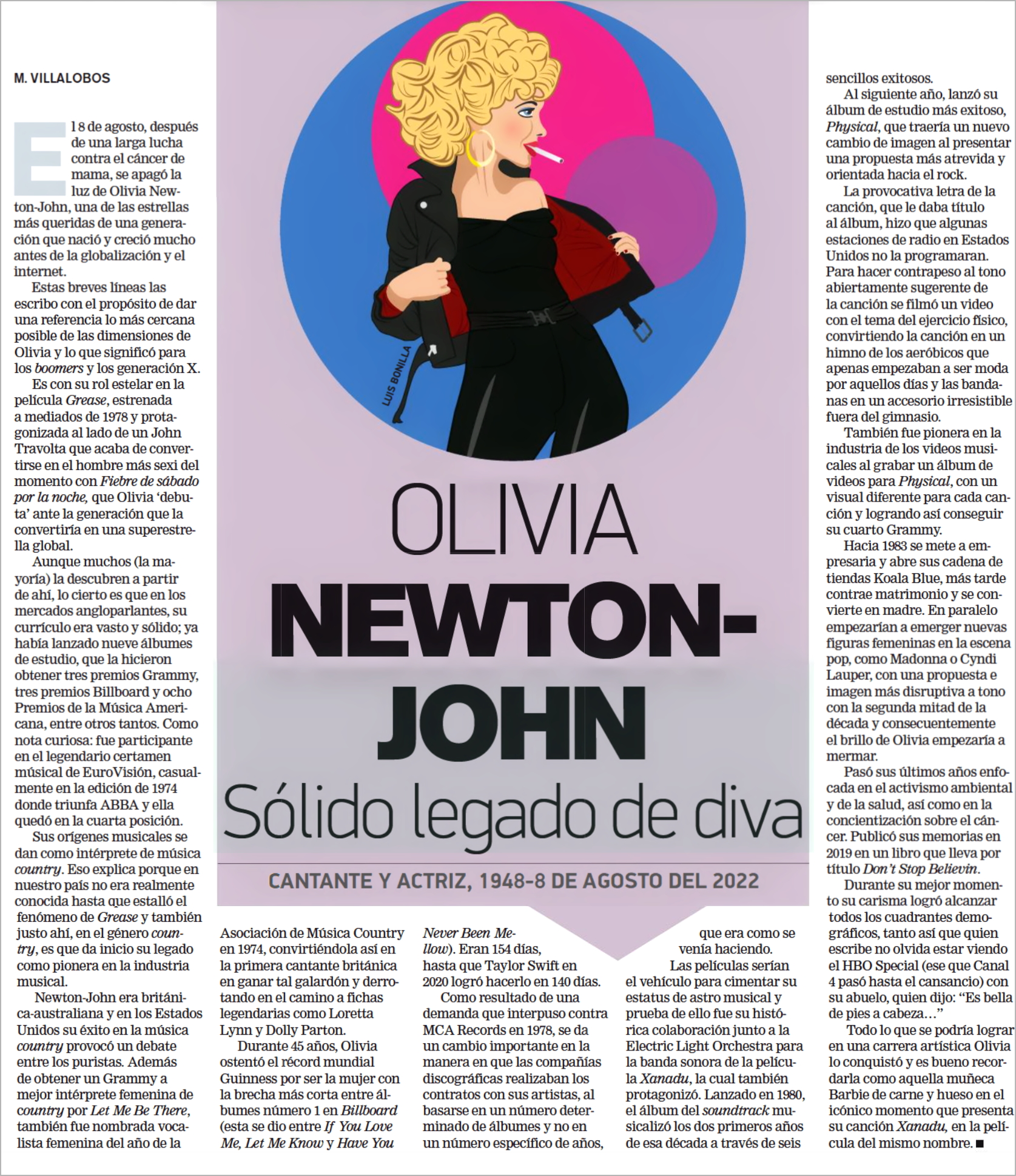Diva Legacy
Translated from Spanish
By M. Villalobos
On August 8, after a long fight against breast cancer, the light went out on Olivia Newton-John, one of the most beloved stars of a generation that was born and raised long before globalization and the internet.
I write these brief lines with the purpose of giving as close a reference as possible to Olivia’s dimensions and what she meant to the boomers and generation X.
It is with her starring role in the film Grease, released in mid-1978 and starring alongside John Travolta who has just become the sexiest man of the moment with Saturday Night Fever, that Olivia ‘debuts’ to the generation that would make her a global superstar.
Although many (most) discover her from there, the truth is that in the English-speaking markets, her curriculum was vast and solid; She had already released nine studio albums, which earned her three Grammy Awards, three Billboard Awards, and eight American Music Awards, among many others. As a curious note: she was a participant in the legendary EuroVision music contest, coincidentally in the 1974 edition where ABBA triumphed and she was in fourth position.
Her musical origins are given as an interpreter of music country. That explains why she was not really known in our country until the Grease phenomenon broke out, and it is also right there, in the country genre, that her legacy as a pioneer in the music industry began.
Newton-John was British-Australian and in the United States her success in music country sparked a debate among purists. In addition to winning a Grammy for Best Female Country Performer for Let Me Be There, she was also named Female Vocalist of the Year for the
Country Music Association in 1974, thus making her the first British singer to win such an award and defeating legendary figures like Loretta Lynn and Dolly Parton along the way.
For 45 years, Olivia held the Guinness World Record for being the woman with the shortest gap between Billboard’s No. 1 albums (this was between If You Love Me, Let Me Know and Have You Never Been Mellow). It was 154 days, until Taylor Swift in 2020 managed to do it in 140 days.
As a result of a lawsuit she filed against MCA Records in 1978, there was a major change in the way record companies contracted with their artists, based on a set number of albums rather than a specific number of years, which was how it had been done.
The movies would be the vehicle to cement her status as a musical star and proof of this was his historic collaboration with the Electric Light Orchestra for the soundtrack of the film Xanadu, in which she also starred. Released in 1980, the soundtrack album set to music the first two years of that decade through six hit singles.
The following year, she released her most successful studio album, Physical, which would bring a new makeover by presenting a more daring and rock-oriented proposal.
The provocative lyrics of the song, which gave the album its title, caused some radio stations in the United States to not play it. To counterbalance the openly suggestive tone of the song, a video with the theme of physical exercise was filmed, turning the song into an anthem of aerobics that was just beginning to be fashionable in those days and bandanas into an irresistible accessory outside the gym.
She also pioneered the music video industry by recording a video album for Physical, featuring a different visual for each song, earning her fourth Grammy.
Around 1983, she became a businesswoman and opened her Koala Blue chain of stores, later she married and became a mother. At the same time, new female figures would begin to emerge on the pop scene, such as Madonna or Cyndi Lauper, with a more disruptive proposal and image in tune with the second half of the decade and consequently Olivia’s brilliance would begin to diminish.
She spent her later years focused on environmental and health activism, as well as cancer awareness. She published her memoirs in 2019 in a book entitled Don’t Stop Believin.
During her best moments, her charisma managed to reach all the demographic quadrants, so much so that the writer (of this article) does not forget watching the HBO Special (the one that Channel 4 broadcast ad nauseam) with her grandfather, who said: “She is beautiful from head to toe… ”
Olivia conquered everything that could be achieved in an artistic career and it is good to remember her as that flesh and blood Barbie doll in the iconic moment that she presents her song Xanadu, in the movie of the same name.
